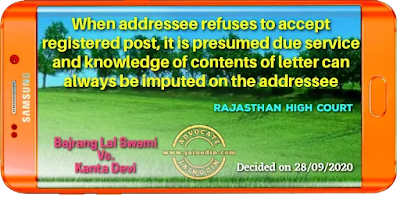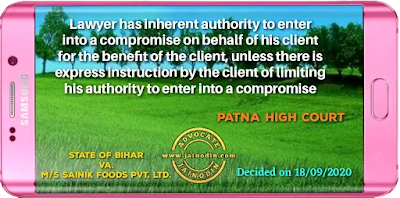After calling report u/s.202 of CrPC, Magistrate can not order investigation u/s.156(3) of CrPC.
I may first deal with the question as to whether the Magistrate ought to have proceeded under Section 156(3), after receipt of enquiry report from Senior Superintendent of Police, Srinagar, sought on taking cognizance of complaint and after deferment of process or was required to proceed under Section 202(1) and what are the parameters for exercise of power under the two provisions.[Para No.12]
The two provisions are in two different chapters of the Code, though common expression 'investigation' is used in both the provisions. Normal rule is to understand the same expression in two provisions of an enactment in same sense unless the context otherwise requires. Heading of Chapter XII is "Information to the Police and their Powers to Investigate" and that of Chapter XV is "Complaints to Magistrate". Heading of Chapter XIV is "Conditions Requisite for Initiation of Proceedings". The two provisions i.e. Sections 156 and 202 in Chapters XII and XV respectively are as follows :
"156. Police officer's power to investigate cognizable case.
(1) Any officer in charge of a police station may, without the order of a Magistrate, investigate any cognizable case which a Court having jurisdiction over the local area within the limits of such station would have power to inquire into or try under the provisions of Chapter XIII.
(2) No proceeding of a police officer in any such case shall at any stage be called in question on the ground that the case was one which such officer was not empowered under this section to investigate.
(3) Any Magistrate empowered under section 190 may order such an investigation as above- mentioned.
202. Postponement of issue of process.-
(1) Any Magistrate , on receipt of a complaint of an offence of which he is authorized to take cognizance or which has been made over to him under section 192, may, if he thinks fit, [and shall in a case where the accused is residing at a place beyond the area in which he exercises his jurisdiction] postpone the issue of process against the accused, and either inquire into the case himself or direct an investigation to be made by a police officer or by such other person as he thinks fit, for the purpose of deciding whether or not there is sufficient ground for proceeding:
Provided that no such direction for investigation shall be made, -
(a) where it appears to the Magistrate that the offence complained of is triable exclusively by the Court of Sessions; or
(b) where the complaint has not been made by a Court, unless the complainant and the witnesses present (if any) have been examined on oath under section 200.
(2) In an inquiry under sub-section (1), the Magistrate may, if he thinks fit, take evidence of witnesses on oath:
Provided that if it appears to the Magistrate that the offence complained of is triable exclusively by the Court of Session, he shall call upon the complainant to produce all his witnesses and examine them on oath.
(3) If an investigation under sub-section (1) is made by a person not being a police officer, he shall have for that investigation all the powers conferred by this Code on an officer in charge of a police station except the power to arrest without warrant."[Para No.13]
Cognizance is taken by a Magistrate under Section 190 (in Chapter XIV) either on "receiving a complaint", on "a police report" or "information received" from any person other than a police officer or upon his own knowledge.
Chapter XV deals exclusively with complaints to Magistrates. Reference to Sections, 202, in the said Chapter, shows that it provides for "postponement of issue of process" which is mandatory if accused resides beyond the Magistrate's jurisdiction (with which situation this case does not concern) and discretionary in other cases in which event an enquiry can be conducted by the Magistrate or investigation can be directed to be made by a police officer or such other person as may be thought fit "for the purpose of deciding whether or not there is sufficient ground for proceeding". I am skipping the proviso as it does not concern the question under discussion. Clause (3) provides that if investigation is by a person other than a police officer, he shall have all the powers of an officer incharge of a police station except the power to arrest.[Para No.14]
Chapter XII, dealing with the information to the police and their powers to investigate, provides for entering information relating to a 'cognizable offence' in a book to be kept by the officer incharge of a police station (Section 154) and such entry is called "FIR". If from the information, the officer incharge of the police station has reason to suspect commission of an offence which he is empowered to investigate subject to compliance of other requirements, he shall proceed, to the spot, to investigate the facts and circumstances and, if necessary, to take measure, for the discovery and arrest of the offender (Section 157(1).[Para No.15]
Power under Section 202 is of different nature. Report sought under the said provision has limited purpose of deciding "whether or not there is sufficient ground for proceeding". If this be the object, the procedure under Chapter XV of the Code of Criminal Procedure are required to be adhered to in letter and spirit.[Para No.19]
Admittedly the Magistrate has taken cognizance and find it necessary to postpone issuance of process, therefore, directed for enquiry by the Police and on receipt of the report from SSP, Srinagar, the Magistrate was required to proceed in terms of the provisions contained in Chapter XV of the Criminal Procedure Code. Thus, I answer the first question by holding that the direction under Section 156(3) is to be issued, only after application of mind by the Magistrate. When the Magistrate does not take cognizance and does not find it necessary to postpone instance of process and finds a case made out to proceed forthwith, direction under the said provision is issued, when Magistrate takes cognizance and postpones issuance of process, the Magistrate has yet to determine "existence of sufficient ground to proceed" and these cases fall under Section 202. Subject to these broad guidelines available from the scheme of the Code, exercise of discretion by the Magistrate is guided by interest of justice from case to case.[Para No.20]
To reiterate for the guidance of all the Magistrates in the Union Territory of Jammu and Kashmir and Union Territory of Ladakh, it has become necessary to refer the Judgment reported in (2010) 4 Supreme Court Cases 185 titled Rameshbhai Pandurao Hedau Vs. State of Gujrat, which postulates that while the power to direct a police investigation under Section 156(3) is exercisable at the pre-cognizance stage, the power to direct an investigation or an enquiry under Section 202(1) is exercisable at the post-cognizance stage, when the Magistrate is in seisin of the case.[Para No.21]

The settled legal position has been enunciated by the Hon'ble Supreme Court in several decisions and has observed that the Courts are ad idem on the question that the powers under Section 156(3) can be invoked by the Magistrate at a pre-cognizance stage, whereas powers under Section 202 of the Code are to be invoked after cognizance is taken on a complaint, but before issuance of process. Such a view has been expressed in Suresh Chand Jain case reported in (2001) 2 SCC 628: 2001 SCC (Cri) 377 as well as in Dharmeshbhai Vasudevbhai case, reported in (2009) 6 SCC 576: (2009) 3 SCC (Cri) 76 and in Devarapalli Lakshminarayana Reddy case, reported in (1976) 3 SCC 252: 1976 SCC (Cri) 380.[Para No.22]


















